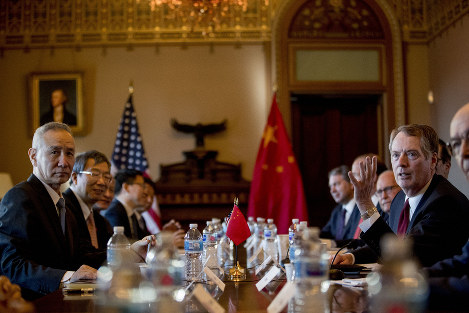
US, China hold ministerial talks to defuse trade tensions
WASHINGTON (Kyodo) -- Senior officials from the United States and China started a two-day meeting in the U.S. capital Wednesday in an effort to resolve the tariff war between the two countries, China's Xinhua News Agency reported.
The ministerial talks came as U.S. President Donald Trump has vowed to impose additional tariffs on Chinese imports on March 2, a move that would further affect the world economy, unless the two sides strike a deal to address what Washington perceives as Beijing's "unfair" trade practices.
U.S. Trade Representative Robert Lighthizer represents the United States in the talks, while the Chinese delegation is led by Vice Premier Liu He.
Treasury Secretary Steven Mnuchin, who is also attending the talks, criticized China's trade practices and economic policy, saying that while Beijing has free access to the U.S. market, Washington has "limited" access to the Chinese market.
"The critical issue that we've talked about is market access, making sure there aren't forced joint ventures, not forced transfer of technology and that we have a mechanism that when we reach an agreement that we can monitor this agreement and that they'll live up to it," Mnuchin told Fox Business on Tuesday.
"And that's how I expect we'll make significant progress this week on those issues," he said.
Calling for fair and reciprocal trade, the Trump administration has pushed Beijing to address alleged intellectual property theft and forced technology transfer, subsidies to state-owned enterprises, and nontariff barriers to American products.
In the talks, the two sides are discussing "China's pledge to purchase a substantial amount of goods and services from the United States" as a way of reducing the U.S. trade deficit with the world's second-largest economy, according to the White House.
Speaking to U.S. business news network CNBC last week, Commerce Secretary Wilbur Ross pressed China to buy more American soybeans and liquefied natural gas.
Ross also demanded that China advance "structural reforms that we really think are needed in the Chinese economy" because just buying more American products is not enough to address the bilateral trade imbalances in a sustainable way.
In a Dec. 1 summit in Buenos Aires, Trump and Chinese President Xi Jinping agreed that the two countries would refrain from imposing further tariffs on each other's imports for 90 days while trying to complete trade talks.
Source : https://mainichi.jp/english/articles/20190131/p2g/00m/0bu/005000c
Source: https://mainichi.jp/english/articles/20190131/p2g/00m/0bu/005000c
 English
English Japan
Japan

walmart pharmacies daily use of viagra pfizer viagra pills sildenafil guys junk pictures what is sildenafil citrate 100mg generic cialis 20 yellow pill
plaquenil jak kupic hydroxychloroquine nz plaquenil for covid 19 dosage how long will it taje to get used to generic plaquenil
modafinil smart drug provigil purchase online buy provigil without a prescription how do you feel on provigil
azithromycin 500mg tablet azithromycin 500 mg generic zithromax and birth control side effects how many doses of azithromycin to cure chlamydia
appetite suppressant fda approved viagra walmart what is grapefruit for walmart drug prices 2018 viagra pfizer 100mg price walgreens price for viagra alternative to viagra fda approved weight loss medications pfizer free samples chinese male enhancement female viagra pill fast viagra shipping usa best energy pills over the counter viagra sildenafil viagra in mexico list of benzodiazepines viagra dosage which is better cialis or viagra libido male enhancement pills side effects of viagra cialis and viagra combination viagra and lung disease canadian prescription drugs compare viagra no prescription viagra patent expiration date extended walmart online price check viagra tablet compare viagra and cialis dosage
amoxicillin clav amoxicillin medicine amoxil 500 mg po polsku reaccipnes alergicas del amoxil en ninos
order priligy what is priligy tablets how to buy priligy im 16 years old
zithromax 500mg how much azithromycin to treat chlamydia how does azithromycin work
prednisone withdrawal remedies deltasone costs does prednisone make you tired what are the side effects of taking prednisone?
equine ivermectin stromectol pill how long does ivermectin work? how long does ivermectin continue to kill mites after you take it
moa pharmacology use of sildenafil in women my walmart account sign in pfizer viagra viagra and blood pressure medication best men enhancement products over counter viagra in walgreen
neurontin litigation gabapentin online pharmacy will neurontin show on a drug test how much gabapentin for anxiety
chloroquine azithromycin buy zithromax online zithromax dose for strep throat azithromycin when to take
neurontin legacy where to buy neurontin what is the drug neurontin prescribed for how to stop taking gabapentin 100mg
albuterol-ipratropium combivent generic how often can you use ventolin flovent and ventolin which one first
is there women's viagra tadalafil 5 mg best price female viagra pills sildenafilo ed pills that work cvs rx transfer coupon 25.00
amoxil adverse effects order amoxicillin no prescription amoxil clavulanate 875/125 amoxil 500 mg dosage for throat infection
cialis and melanoma cancer sildenafil prices at walgreens amazon sildenafil viagra prescription drugs cialis picture testimonials online ed rx what causes increased libido